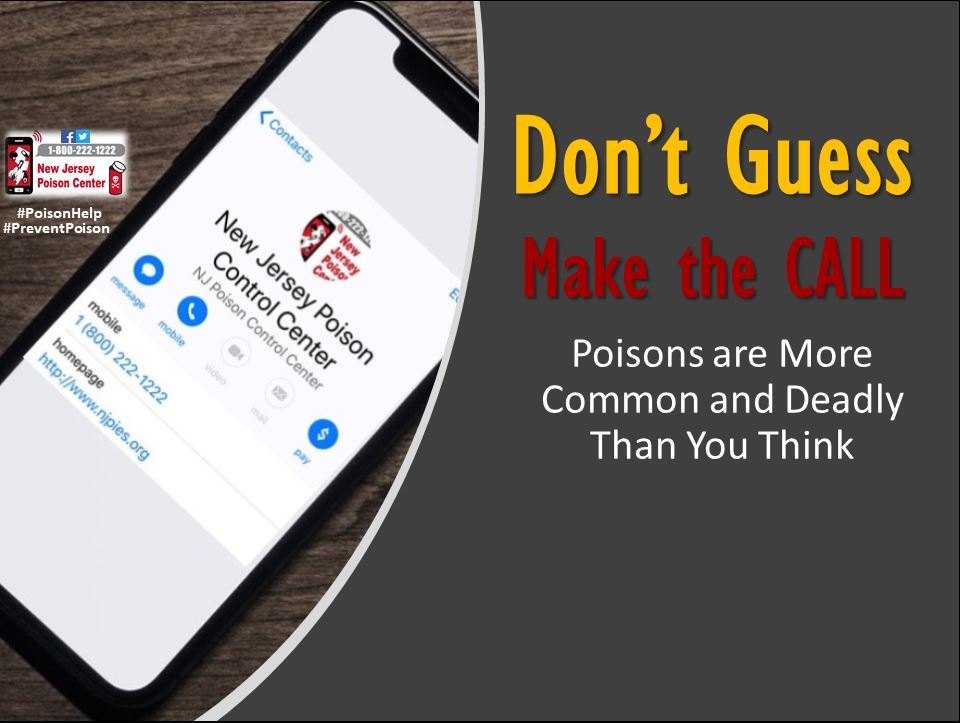Poison Center Cautions About Candy Look-Alikes
This week, a pre-teen was admitted to a NJ hospital experiencing adverse health effects after ingesting a large quantity of candy containing marijuana. The candy (Medicated Sour Skittles) was packaged almost identically to the popular and widely sold name brand candy. A month before this incident, a similar case occurred but in a young child. In this case, the 3-year-old needed to be admitted to the ICU, after eating a cannabis candy which looked identical to a Nerds Rope, another favorite to candy consumers.
Although New Jersey is on the brink of a large-scale rollout of recreational marijuana products for adults, it is important to remember that marijuana can and does have toxic effects on children. As witnessed in other states with recreational marijuana programs, pediatric exposures to these products increase as edibles become widely available. Poison Control Centers around the country have seen a significant increase in calls regarding children who accidently eaten/swallowed products containing THC. Further complicating matters are candy look-alike products, such as gummy bears or the products mentioned above, which are very enticing to kids. 
In 2020, the New Jersey Poison Control Center assisted in the medical treatment of more than 55 children under the age of 5, and more than 30 children between the ages of 6 and 12 who consumed edible products containing THC – more than double those assisted in the previous year (2019) and 6 times as much as in 2018.
The New Jersey Poison Control Center is warning the public to keep marijuana edibles in a secure/locked place in their homes. Children who ingest edibles are at high risk for marijuana overdose, which can lead to severe health effects.
“It is difficult for anyone, especially children, to distinguish an edible marijuana product from food when the packaging is almost identical to common everyday products,“ says Diane Calello, executive and medical director of the New Jersey Poison Control Center at Rutgers New Jersey Medical School, Department of Emergency Medicine. “For this reason, it’s important to safely store these products in the home. It’s also time to say – does that edible product really need to look that much like a favorite candy? Is it worth the risk?”
“Since edibles may be highly concentrated, limit the number of edibles you have at home if you live with young and school-aged children,” says Lewis Nelson, chair of Emergency Medicine at Rutgers New Jersey Medical School. Many edible products look and taste like store-bought treats and other food products, making it difficult for children to know the difference. Although edibles like brownies, gummies, and lollipops can be fun and/or therapeutic for adults, high levels of THC (the psychoactive ingredient in marijuana), can lead to dangerous overdose symptoms in small children.
”Unlike in adults, marijuana exposure in children can lead to dangerous side including trouble breathing, loss of coordination, drowsiness, and seizures. In severe cases, children may need to be admitted to an intensive care unit and even need a ventilator.
- When using or storing marijuana products in the home remember the following tips to prevent accidental exposure:
- Store edible products in a secure/locked place in the home, out of sight and reach of children and pets.
- Marijuana products can also cause severe health effects in pets.
- Limit the amount/number of edible products you have in the house at one time.
- Be aware of the potency (concentration of tetrahydrocannabinol/THC) of the edibles you have at home.
- The effects of edible marijuana may be delayed and more severe hours later.
If you suspect a poisoning involving a marijuana product, call your local poison control center immediately at 1-800-222-1222 for medical treatment advice. Poison Control Centers are staffed by healthcare professionals 24/7. If someone is unconscious, not breathing, hard to wake up, or having a seizure, immediately call 9-1-1. New Jersey residents can reach their poison control center: Call (1-800-222-1222); Text (973-339-0702); Chat via website.